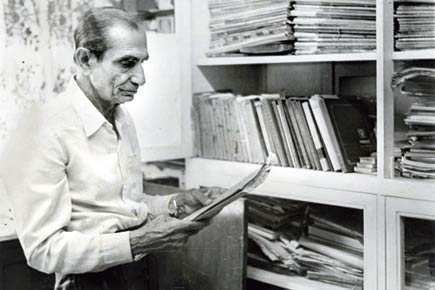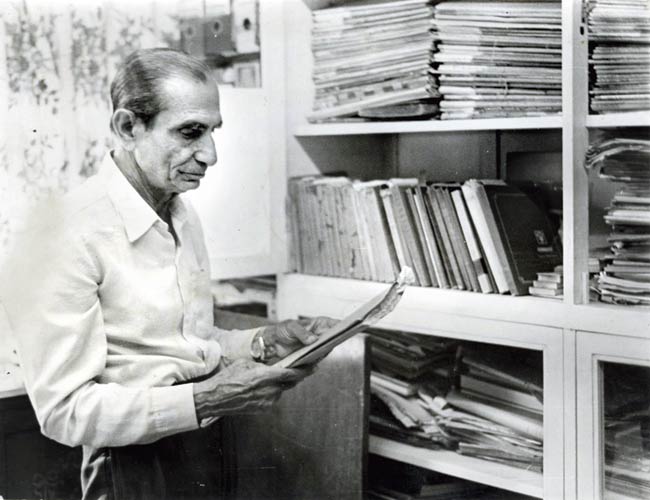Two cricketing personalities surprised me by handing me a copy of their bio-data before they could be interviewed

 Two cricketing personalities surprised me by handing me a copy of their bio-data before they could be interviewed. One was former India captain Polly Umrigar and the other, Anandji Dossa India’s best-loved cricket statistician who passed away on Monday in New York.
Two cricketing personalities surprised me by handing me a copy of their bio-data before they could be interviewed. One was former India captain Polly Umrigar and the other, Anandji Dossa India’s best-loved cricket statistician who passed away on Monday in New York.
I don’t possess Umrigar’s pencil jottings. Maybe, I didn’t ask him for them, but I have preserved Dossa’s resume including the typed one. Doubtless, it has great value attached to it, but not greater value than what Dossa brought to Indian cricket through his contribution.
ADVERTISEMENT

A file picture of Anandji Dossa at his Santacruz home in 1990. Pic/mid day archives
Dossa was an encyclopedia. He remembered a lot more than mere cricket enthusiasts, but also believed in hard work; selfless work. Sure, he would have used up a chunk of the 4 am to 8 am segment of his day reserved for research till the 1990s to answer a query of a journalist or a fellow statistician, but it would be as accurate as today’s Statsguru on Cricinfo. And he would leave his benefactor with a guilty feeling through his kindness, his modesty.
“Oh yes,” he used to say often to a request. And with his, “thank you for visiting me,” utterance he made the world a beautiful place to be in.
Dossa could provide details that went beyond figures. For example, when radio commentators discussed the fielding skills of Rusi Surti, Dossa proved to be as versatile as the all-rounder by embellishing the conversation with all details of how Surti affected those run outs in the 1960s. Dossa first served All India Radio as a statistician and scorer in 1958-59.
Dossa would go to any length to get additional information, even ask cricketers if they could add to his knowledge. After he had scored two hundreds in an innings twice in two Harris Shield seasons and five hundreds in a row former Mumbai wicketkeeper-batsman Kiran Ashar received a call from Dossa enquiring whether he had read about anyone else who performed a similar feat. After Ashar provided him details, he received a letter of deep appreciation that ended like this, “With best wishes for your very bright future and Bradman like scores Anandji.”
It was this thirst for knowledge that sparked off Dossa’s cricket interest. I remember him telling me the story of him being on a family vacation in 1932 at Dharampur. While consuming a snack served in a newspaper, he noticed an India versus England match report. He took the page home and started following cricket.
Humility was second nature to Dossa, as Kolkata-based journalist Mudar Patherya experienced when he approached Dossa for an interaction in 1989. He stressed the point to the journalist that he didn’t deserve any recognition through the article. The 74-year-old Dossa finally relented and they met at his Santacruz flat. Patherya’s fine piece included a passage, which was so true: “At an age when most septuagenarians would be worried about their cataract, Dossa is worried about getting the scores of the Presidency matches between 1892 and 1895.”
Dossa was an authority on Indian cricket through all levels. He started his specialisation after he found keeping track of international cricket too stressful and always advised young statisticians to concentrate on Indian cricket.
In many ways, he was a cricket tragic. He possessed a bit of memorabilia and even collected posters. And if you received his cricket-themed greeting card, you had to consider yourself lucky.
Dossa told me that the most valuable part of his collection was the year-by-year press clippings from 1937 to the new millennium, and he was right. For, no amount of books on Indian cricket can provide so much information like those brown paper-covered books. The BCCI would do well to use their good relations with the CCI to duplicate those clippings and display them prominently when the Board’s museum comes to fruition.
Both the Mumbai Cricket Association and the BCCI would also do well to institute the Anandji Dossa Trophy for the best scorer. Its benefit will be two-fold: An important aspect of cricket like scoring will get due importance, and two, it will be an apt way of honouring a truly faithful servant of Indian cricket who the late Raj Singh Dungarpur felt should stand on his own pedestal among the greats of the game.
Falling two short of a century on Monday was near-tragic for Dossa’s friends. They knew how determined he was to complete his century. Leaving us before his landmark reminds me of the title of Leonard Cohen’s song, Hey, that’s no way to say goodbye!
Clayton Murzello is mid-day’s Group Sports Editor
 Subscribe today by clicking the link and stay updated with the latest news!" Click here!
Subscribe today by clicking the link and stay updated with the latest news!" Click here!







